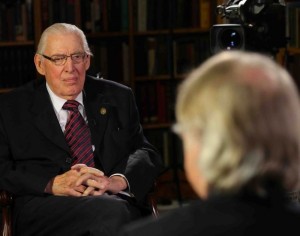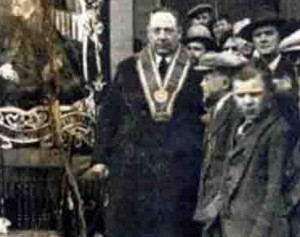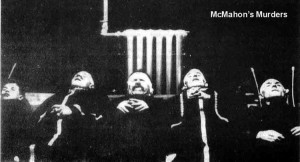Paisley’s admiration for loyalist copper who led Catholic mass killings
Posted By: January 17, 2014
Hugh Jordan. Sunday World.com ( Dublin).Thursday 16th January 2014
Ian Paisley TV interview
John William Nixon is seen in long black coat
Firebrand preacher and DUP founder Ian Paisley modelled his career on a hardline unionist politician who had previously led a secret life as a loyalist killer.
And in an explosive documentary broadcast on BBC TV, he speaks of his admiration for him.
The former First Minister and ex-Moderator of the Free Presbyterian Church, was so taken with the ‘no surrender’ style of Independent Unionist MP John William Nixon, he personally drove him to Stormont every week just to hear him speak.
A native of County Cavan, Nixon had previously been a District Inspector in the Royal Irish Constabulary and after moving north of the border he joined the newly formed RUC retaining his previous rank.
And he later represented the Woodvale district of loyalist west Belfast for over 20 years.
But it was during his time as the leader of a secret loyalist murder gang that Nixon was widely suspected of masterminding and taking part in a series of sectarian murders of innocent Catholics in Belfast, including the horrific slaughter of the McMahon family in their own home.
In the early hours of March 24 1922, D.I. Nixon and a hand-picked assassination squad recruited from the newly formed Ulster Special Constabulary used a sledge hammer to smash their way into the family home of prominent Catholic publican Owen McMahon at Kinnaird Terrace, off the Antrim Road. It was 1.20am and the family were all in bed asleep.
At gun point, the female residents were ordered into one room and the men into another.
After rounding up all eight male occupants, who were all in bed asleep, Nixon told the men to say their prayers before ordering the Special Constables to shoot them. Four of the McMahons and a young Donegal man Edward McKinney, who worked as a barman in the family business, died at the scene and another two died later.
Seconds before he was shot, 50 year-old Owen McMahon demanded to know why his family was being subjected to this terror. One of the gunmen told him it was because he was “ a respected Papist.” The youngest member of the McMahon family to die was Thomas who was just 15-years-old.
And Nixon also led his men to the home of another Catholic publican at 28 Cardigan Drive off nearby Cliftonville Road, where they abducted the respected businessman at gunpoint. His lifeless and badly mutilated body was found in a field off Crumlin Road a few day later.
Nixon’s mass murder campaign was part of a carefully orchestrated unionist plan secretly sanctioned at the highest level to coerce the Catholic community in the north to accept the Partition of Ireland which had been forced upon them 10 months earlier.
Tomorrow night speaking about Nixon on TV in the first of a two part series, Ian Paisley, now 87, tells interviewer Eamon Mallie of his admiration for John William Nixon.
“I liked a man who was prepared to stand up for what he believed in.He was important in my life because he was the impersonation of the battle and it really was about in Northern Ireland.” said Paisley.
And he added: “And of course it was a stand taken against those that would take away our flag, take away our position on the union.”
Respected historian Eamon Phoenix told the Sunday World: “There is no doubt, Ian Paisley modelled himself at least in part on John William Nixon. He loved listening to him speak at Stormont.”
In the new Northern Ireland state set up after Partition, John William Nixon – who was also a staunch member of the Orange Order – had hoped to continue his police career as a member of the RUC.
However, his unionist masters believed his murderous past might come back to haunt him and he found his prospects of further promotion blocked at every opportunity.
The McMahon family’s bodies after being murdered
Unionist leaders hoped to brush Nixon’s past misdemeanors under the carpet by using contacts to arrange a job for him in Canadian police service. Nixon declined the offer.
Four months after the McMahon family atrocity, Nixon wrote to the Ministry of Home Affairs to complain about his lack of promotion. In his letter he wrote: “I tried to do my best to defeat the conspiracy against Ulster.”
Sir James Craig, the new Northern Ireland Prime Minister became aware of the situation and made inquiries with the Home Affairs Minister, who told him: “Mr. Nixon wasn’t suitable for a higher command.”
The Minister told Craig that Nixon had become steeped in loyalist extremism and he was prepared to interpret the laws as he saw fit.
Following the murder of another Catholic publican in the Old Park area, which was Nixon’s police district, James Craig moved swiftly to remove him from his post.
He was finally dismissed from the RUC in February 1924 following a speech he gave to an Orange Lodge in Belfast. He went on to carve out a political career as an independent unionist politician.
It is widely believed the documentary which was filmed late last year will be Ian Paisley’s political and personal swan song as his lengthy and often controversial life draws to its conclusion.
The programme is being seen as a major coup for both the BBC and also for journalist Eamon Mallie who managed to persuade Paisley to do the final interview of his life.













